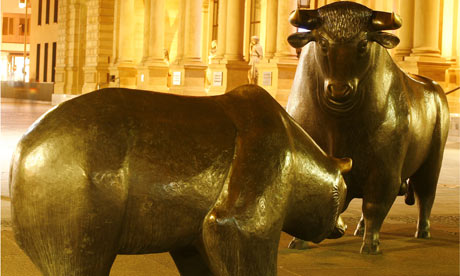Double-dip recession: bulls and bears diverge over future economic prospects
In a difficult environment for economic forecasting, consensus is disappearing and the debate on the likelihood of a second recession has polarised.

The bearsThere is growing evidence that since June, the burgeoning confidence among retailers, manufacturers and economic commentators in the economy's ability to bounce back from the financial crisis has evaporated.
Most City economists believe the risk of the UK sinking back into recession has risen in recent months as the effects of the unprecedented fiscal stimulus seen across the western world comes to an end. Albert Edwards of French bank Société Générale is known as an super-bear who has consistently warned, Cassandra-like, that the western economies are heading back into recession. Despite some strong recovery stories in Europe, he repeatedly tells his investors the worst is yet to come. In a recent note he said:
"The current situation reminds me of mid-2007. Investors then were content to stick their heads into very deep sand and ignore the fact that The Great Unwind had clearly begun.
"The recent reaction to data suggests the market is in a similar deluded state of mind. Yet again, equity investors refuse to accept they are now locked in a Vulcan death grip and are about to fall unconscious."
In another typically downbeat update he said last month that there was "too much hope" among investors and that once that optimism had been washed away, stock markets were in for a "bloodbath".
The City's money men are a bearish lot and Neil Woodford, who runs the £17bn Invesco Perpetual income fund, warned this week that Britain had edged closer to a double-dip recession, focusing his analysis on the prospect, or lack thereof, of house price rises.
Economists can be even more gloomy, led by the doyen of doom-mongers, Nouriel Roubini, and Paul Krugman, both of whom have nagged governments to boost spending to prevent an impending double dip. Roubini, a New York University professor nicknamed Dr Doom for having predicted the financial crisis, reckons the chances of renewed recession are 40% and rising.
Krugman, a professor of economics at Princeton, has berated the US and European governments for their decision to put deficit reductions ahead of securing economic growth. "Let's be clear: a recovery that involves growth so slow that unemployment and excess capacity rise, not fall, isn't really a recovery. If we have only have 1.5% growth, that will amount to a double dip in all the senses that matter," he said in July.
The bullsMost sectors of the UK and US economies have slowed in recent months, but there are reasons to be cheerful, with stock markets heading back towards their year highs, manufacturing activity growing and many retailers still upbeat.
One of Britain's best known business figures, Tesco boss Sir Terry Leahy, said earlier this year that the recession was over, despite ongoing fears about the health of the economy.
A strong performance at Christmas and lower fuel prices were chief among the indicators that encouraged him to say in February that the worst was behind us: "I would say that the consumer has come out of recession, and I'm confident that will build."
When he announced in June that he was stepping down from Tesco, he reiterated his positive outlook. "By March 2011 we'll be into a strong recovery and that's a good time for a new team to take over," he said.
And then there are China and India, the world's two most populous nations, enjoying near double-digit growth and promising to soak up goods and services from all over the globe for some time to come.
Both are, of course, members of the "Bric" group of fast-developing nations, the acronym formed along with Brazil and Russia. The man credited with coining that term, Goldman Sachs chief economist Jim O'Neill, is, fittingly, among the bulls. Last week it was revealed that he will have the chance to put his bank's money where his mouth is when he moves from his current post to be head of Goldman Sachs's asset management business, with a whopping $800bn under management.
Warren Buffett, the world's most influential investor, said earlier this week that harbingers of doom were looking at the wrong data. He said the companies he owns – and he owns large slices of lots of them, including Coca-Cola and Wells Fargo bank – were doing well, with no sign of a new decline.
"We will not have a double-dip recession at all," Buffett said. "I see our businesses coming back almost across the board. I've seen sentiment turn sour in the last three months or so, generally in the media, but I don't see that in our businesses. I see we're employing more people than a month ago, two months ago."
Central bankers Mervyn King and Ben Bernanke – the Bank of England governor and the chairman of the Federal Reserve respectively – have also both argued that they expect their economies to struggle through without a second recession.
Link -
http://www.guardian.co.uk/business/2010/sep/16/double-dip-recession-bulls-bears============
We will all make up our own minds!
However, for most, it will be too late, one way or the other!
Btw, I posted the article, because I liked the picture.

 Forum
Forum

 Home
Home 

 Album
Album 

 Help
Help

 Search
Search

 Recent
Recent 

 Rules
Rules 

 Login
Login

 Register
Register





 Pages:
Pages: 

